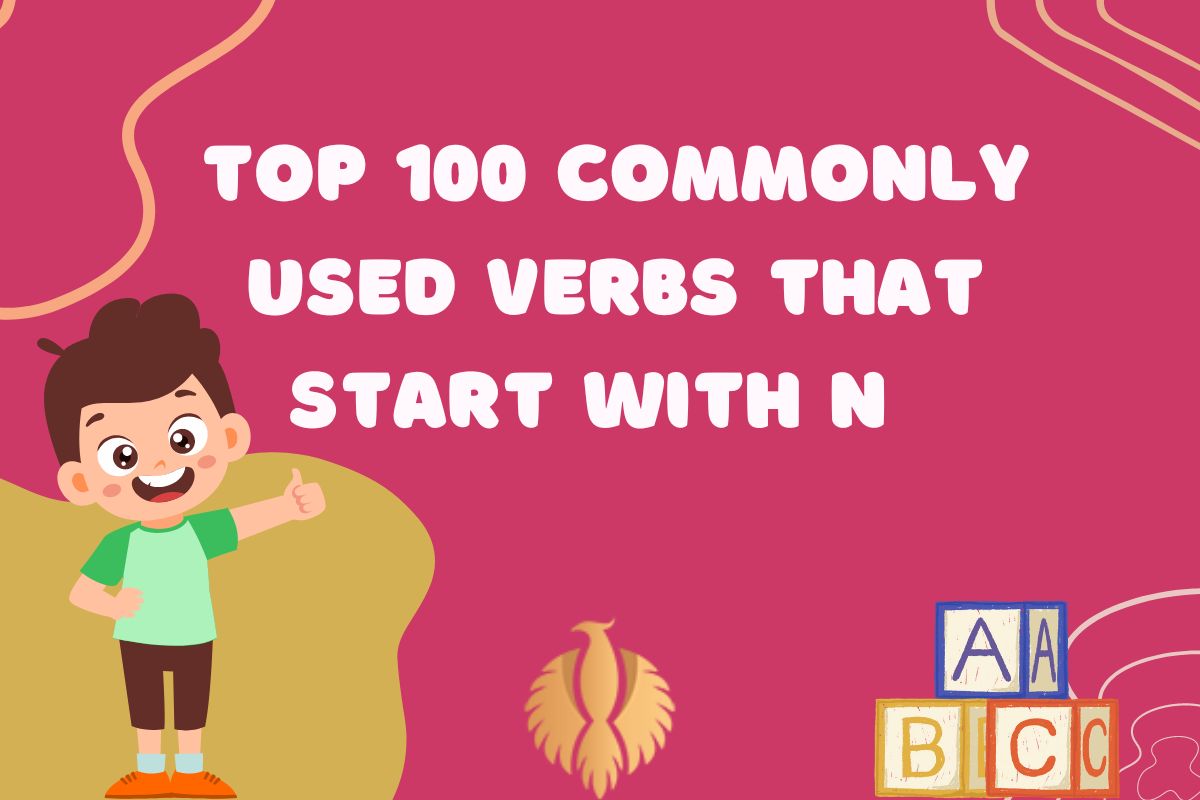To begin with a direct answer to the title, the following are the top 100 commonly used verbs that start with the letter “N”:
![a infographic for Top 100 Commonly Used Verbs That Start With N [2024]](https://phoenixenglishlang.com/wp-content/uploads/2024/06/unnamed-12.png)
- Name
- Need
- Notice
- Negotiate
- Nourish
- Nurture
- Navigate
- Notify
- Nurture
- Nominate
- Neglect
- Nourish
- Network
- Nullify
- Normalize
- Nip
- Nuance
- Negate
- Nudge
- Nibble
- Nurture
- Nest
- Negotiate
- Nominate
- Name
- Note
- Null
- Navigate
- Natch
- Nuzzle
- Negotiate
- Nullify
- Nap
- Negotiate
- Nitpick
- Nourish
- Nod
- Nursed
- Necessitate
- Nestle
- Need
- Normalize
- Nudge
- Nurtured
- Nobody
- Nail
- Notify
- Nurturing
- Note
- Navigate
- Nominate
- Nullify
- Natter
- Nurtured
- Nosh
- Normalized
- Negotiate
- Nod
- Nibble
- Nail
- Négligé
- Nuzzle
- No-go
- Namecheck
- Nuanced
- Negotiate
- Nail
- Nudge
- Net
- Narrows
- Negotiate
- Nutrify
- Nuclear
- Nurtured
- Nifty
- Narrow
- Nudge
- New
- Navigate
- Nester
- Nominate
- Need
- Notice
- Nip
- Normalize
- Nurture
- Nix
- Nod
- Negate
- Notate
- Nail
- Nut
- Nozzle
- Nomads
- Nutmeg
- Nurturing
- Noshed
- Note
- Nudged
- Nebulous
![a infographic about Top 100 Commonly Used Verbs That Start With N [2024]](https://phoenixenglishlang.com/wp-content/uploads/2024/06/unnamed-13.png)
Important Points:
- Variety of Meanings: The verbs listed encompass a wide range of actions and concepts, from simple verbs like “name” and “need” to more complex ones like “negotiate” and “nurture.” This diversity allows for various expressions within English communication.
- Practical Applications: Understanding these verbs can significantly enhance everyday communication skills. Whether in casual conversation, writing, or professional settings, knowing how to use these verbs effectively is key to clear expression.
- Everyday Usage: Many of the verbs included are commonly encountered in daily life. Familiarity with these verbs enables more fluid and natural interactions in both spoken and written English.
- Understanding Context: Each verb has specific contexts in which it is most appropriately used. For instance, “negotiate” is often associated with discussions or agreements, while “nurture” often relates to caring or supporting growth. Recognizing these contexts can aid in more effective communication.
- Conjugation and Forms: Each verb will have various forms such as base forms, gerunds, and participles. Understanding how to conjugate them properly enhances grammatical accuracy when constructing sentences.
This guide will dive deeper into the world of “N” verbs, exploring their meanings, common usages, and examples of how to effectively incorporate them into both speaking and writing.
—
Verbs are the heart of any language, serving as the fundamental building blocks of expression and communication.
Among the plethora of verbs in the English language, those that begin with the letter “N” hold significant value in everyday discourse, allowing speakers to express actions, states, and experiences creatively and accurately.
As we look to 2024, it becomes increasingly essential to keep our vocabulary fresh and relevant, particularly for those seeking to enhance their fluency or convey ideas more effectively.
In compiling this list of the top 100 commonly used verbs that start with “N,” we recognize the importance of these words in shaping meaningful interactions.
From the act of “navigating” complex conversations or “noticing” the nuances in expressions to the nurturing spirit conveyed through verbs like “nurture” and “nourish,” each of these terms enriches our communication.
They reflect actions that connect us with one another, illustrating our thoughts, feelings, and experiences.
Moreover, understanding the full range of “N” verbs provides valuable insights into language use, enabling learners and speakers alike to adapt their expressions according to context.
For example, recognizing when to use “negotiate” versus “nix” can convey different intentions in business settings, where clarity and precision are paramount.
Throughout this exploration, we will not only define each verb but also provide contextual examples that illustrate their proper usage in sentences.
By doing so, we aim to empower learners to assimilate these verbs into their vocabulary effectively.
This guide also emphasizes practical exercises that encourage active engagement with the language, fostering an environment where learners can practice and apply what they have discovered.
As we embark on this journey through the realm of “N” verbs, we invite you to engage your curiosity and expand your linguistic repertoire.
Whether you are an English language learner seeking to build confidence in your speaking skills or a writer looking for ways to enhance your narratives, understanding and utilizing these verbs will enrich your communication.
Join us as we delve into the meanings, applications, and importance of verbs starting with “N,” propelling your English language skills to new heights in the year ahead.
Movement and Human Action

Movement is a fundamental aspect of human life. Verbs that describe physical actions are crucial for expressing everything from subtle gestures to significant movements.
- Navigate: This verb is all about finding one’s way, whether it’s plotting a course for a ship or navigating the complexities of life. I often find myself using this verb when I’m figuring out new routes or even new challenges in my career. It’s fascinating how this word encapsulates both the physical act of moving through space and the metaphorical act of steering through life’s uncertainties.
- Nudge: A gentle push to attract attention. I use this often, especially when I’m trying to subtly point something out to a friend or colleague without making a big deal out of it. Nudging can be a powerful tool in influencing decisions or behaviors gently and unobtrusively.
- Nail: Securing something firmly, usually with nails. But in a broader sense, it can mean achieving something with precision, like nailing a performance or a job interview. The sense of accomplishment associated with this verb makes it a favorite in both professional and personal contexts.
- Nibble: Taking small, quick bites. This verb always reminds me of how I eat when I’m not particularly hungry but just want a taste of something. It’s also used metaphorically to describe tentative approaches or minor incursions, such as nibbling away at a problem.
- Nestle: To settle comfortably within or against something. On cold nights, I love to nestle into my favorite blanket with a good book. This verb conveys a sense of warmth, comfort, and security, making it a favorite when describing cozy, intimate moments.
- Nod: A simple movement of the head to show agreement or acknowledgment. It’s amazing how much a single nod can convey, from understanding to agreement to simple recognition. Non-verbal communication like nodding plays a crucial role in our daily interactions.
- Nip: To bite or pinch sharply. This verb often makes me think of playful pets or the sharp cold of winter air nipping at my nose. It can also describe small, precise actions that have significant effects, like nipping a problem in the bud.
- Nose: Moving forward carefully, often used when someone is cautiously investigating or advancing. I nose through old photos, each one a gateway to cherished memories. It’s a verb that conveys curiosity and careful exploration.
- Nuzzle: Rubbing or pushing gently with the nose and mouth, often a sign of affection. I love watching pets nuzzle against their owners, it’s such a pure expression of love. Nuzzling is a tender and intimate gesture that strengthens bonds.
- Notice: Becoming aware of something. This verb is crucial in everyday life, whether I’m noticing a beautiful sunset or a change in someone’s mood. Being observant and noticing details can significantly enhance our interactions and understanding of the world around us.
You might also enjoy: Top 100 Commonly Used Verbs That Start With I [2024]
Communication and Expression

Communication is at the core of human interaction. Verbs in this category help convey messages, emotions, and information effectively.
- Notify: Informing someone, typically in a formal manner. In professional settings, I often need to notify team members of updates or changes in plans. Notifications are essential for keeping everyone informed and aligned.
- Narrate: Giving a spoken or written account of something. As someone who enjoys storytelling, I find myself narrating events from my day or recounting past experiences. Narration brings stories to life, allowing us to share experiences vividly and engagingly.
- Negotiate: Discussing to reach an agreement. This verb is a staple in both personal and professional realms, whether negotiating terms of a contract or deciding on dinner plans with friends. Negotiation involves skillful communication and compromise to achieve mutually beneficial outcomes. ️
- Name: Giving a title or designation. Naming things, whether it’s a new project or a pet, gives a sense of identity and significance. It’s the first step in defining and distinguishing one entity from another.
- Nurture: Caring for and encouraging growth. This verb is so powerful, whether I’m nurturing a plant, a relationship, or my own personal development. Nurturing involves providing support, care, and encouragement to help something or someone thrive.
- Nudge: Gently pushing or poking to draw attention. Sometimes all it takes is a nudge to get someone to notice something important. It’s a subtle way to influence behavior or decisions without being overbearing.
- Note: Observing or paying particular attention to something. I often note down ideas or important points during meetings to ensure nothing is forgotten. Taking notes helps in retaining and processing information effectively.
- Nod: Indicating agreement or acknowledgment. It’s a simple, non-verbal way to communicate understanding and agreement. Nods are a universal gesture of assent and recognition.
- Neglect: Failing to care for properly. This verb carries a heavy weight, often reminding me of the importance of attention and care in various aspects of life. Neglect can lead to deterioration and loss, highlighting the need for responsibility and diligence.
- Needle: Agitating or aggravating someone. While I try to avoid needling others, it’s a verb that perfectly captures the essence of persistent annoyance. Needling can wear down patience and goodwill, emphasizing the importance of tact in communication.
Mental and Psychological States

Verbs that describe cognitive processes and emotional experiences are essential for expressing our inner world.
- Need: Requiring something because it is essential. Needs drive much of human behavior, from basic necessities to emotional support. Understanding and addressing needs is fundamental to well-being and satisfaction.
- Notice: Becoming aware of something. Noticing the small details in life can make all the difference in our experiences and interactions. It enhances mindfulness and appreciation of the present moment.
- Nurture: Supporting and encouraging growth. In a psychological sense, nurturing oneself or others can lead to profound personal growth and fulfillment. It involves providing the necessary conditions for development and well-being.
- Neglect: Failing to give proper attention to. Neglect can have serious consequences, whether it’s neglecting one’s health, relationships, or responsibilities. It serves as a reminder of the importance of care and attention.
- Nervous: Feeling anxious or apprehensive. We all experience nervousness at times, whether it’s before a big presentation or meeting someone new. This verb captures the anticipation and unease that can accompany uncertainty.
- Nostalgize: Indulging in nostalgia. I often nostalgize about my childhood, reflecting on simpler times and cherished memories. Nostalgia connects us to our past and can provide comfort and a sense of continuity.
- Nauseate: Causing someone to feel sick. This verb can describe physical sickness or a feeling of strong disgust. It’s a powerful way to convey intense aversion or discomfort.
- Necessitate: Making something necessary. Changes in circumstances often necessitate adjustments in plans or behavior. This verb highlights the cause-and-effect relationship that drives many of our decisions.
- Normalize: Bringing or returning to a normal state. After periods of disruption, there’s a strong desire to normalize and regain a sense of stability. Normalizing helps restore balance and predictability.
- Numb: Depriving of feeling or responsiveness. Feeling numb can be a defense mechanism against overwhelming emotions or situations. It’s a way to cope with stress or trauma by temporarily shutting down emotional responses.
You might also enjoy: Top 100 Commonly Used Verbs That Start With M [2024]
Control and Management

Verbs in this category describe actions related to guiding, handling, and organizing, essential for effective management of various aspects of life.
- Navigate: Planning and directing a course. Navigation is crucial not only for travel but also for life’s many decisions and paths. It involves strategic thinking and decision-making to reach desired outcomes.
- Nominate: Proposing or entering someone as a candidate. Nominating someone for an award or position recognizes their achievements and potential. It’s a formal way to acknowledge and support deserving individuals.
- Negotiate: Bringing about an agreement through discussion. Skilled negotiation can resolve conflicts and create win-win situations. It requires effective communication, empathy, and strategic thinking.
- Neutralize: Making something ineffective by applying an opposite force. Neutralizing threats or challenges is a key aspect of problem-solving. It involves identifying and counteracting potential risks.
- Number: Assigning a number to something. Numbering items helps in organization and clarity, whether it’s in a list or data management. It’s essential for maintaining order and precision.
- Nail: Securing something firmly. In management, nailing down details is crucial for the successful execution of plans. It implies precision, accuracy, and thoroughness.
- Nurse: Managing or looking after with care. Nursing not only refers to healthcare but also to carefully managing resources or projects. It emphasizes attention to detail and diligent care.
- Net: Catching or ensnaring. In business, netting a deal or a client is often the goal. It’s about achieving desired outcomes through strategic efforts.
- Network: Connecting with others to exchange information. Networking is essential for building professional relationships and accessing opportunities. It involves creating and maintaining a web of contacts that can support and enhance one’s career or business.
- Nurture: Caring for and protecting during growth. In a management context, nurturing talent and ideas is key to fostering innovation and success. It involves providing support and resources to help individuals and projects flourish.
Creation and Change

These verbs describe making, modifying, and forming, capturing the dynamic processes of production and transformation.
- Narrate: Telling a story or account. Narrating events or ideas helps convey information clearly and engagingly. It’s a powerful tool for communication and education.
- Name: Giving a title or designation. Naming new products, projects, or concepts is a critical step in their development. It provides identity and clarity.
- Nail: Making or securing with nails. Beyond the physical act, nailing down details ensures precision and accuracy in various endeavors.
- Nestle: Positioning comfortably. Nestling ideas into broader plans ensures they are integrated smoothly and effectively.
- Nurture: Helping develop or grow. Nurturing creative processes and innovative ideas leads to breakthroughs and advancements. It involves providing the right conditions for growth and success.
- Negotiate: Arranging or bringing about through discussion. Negotiating terms and conditions is essential in creative and change processes. It ensures all parties are aligned and committed.
- New: Introducing or making something new. Bringing new ideas and concepts into existence is the essence of creativity and innovation. It involves challenging the status quo and exploring uncharted territories.
- Notice: Perceiving or becoming aware of. Noticing trends, patterns, and opportunities is crucial for initiating change and development.
- Normalize: Making normal or returning to a standard. Normalizing new practices or technologies involves integrating them into regular use and acceptance.
- Number: Adding up or totaling. In creative processes, numbering ideas or steps helps in organization and systematic development.
You might also enjoy: Top 100 Commonly Used Verbs That Start With D [2024]
Observation and Cognition

Verbs that express seeing, noticing, and interpreting are crucial for understanding how we perceive and process information.
- Notice: Observing or detecting. Noticing details enriches our understanding and enhances our ability to respond effectively.
- Note: Observing carefully and paying attention. Noting important information is essential for memory and analysis. It’s a fundamental part of learning and comprehension.
- Nod: Signaling with the head. Nodding in agreement or acknowledgment is a subtle yet powerful form of non-verbal communication.
- Nose: Investigating or prying into something. Nosiness, while sometimes intrusive, often leads to deeper understanding and discovery.
- Nibble: Taking small bites or scrutinizing something carefully. Nibbling at problems or ideas allows for careful consideration and gradual progress.
- Nudge: Gently pushing to draw attention. Nudging ideas or actions can prompt change and influence decisions.
- Nurture: Observing and encouraging growth. Nurturing talent and potential involves careful observation and support.
- Navigate: Finding the way to a desired position or goal. Cognitive navigation involves mapping out pathways to achieve objectives.
- Narrow: Becoming or making less wide. Narrowing down options or ideas helps in focusing and making precise decisions.
- Numb: Desensitizing or dulling the perception of. Sometimes, numbing certain distractions is necessary to concentrate on important tasks.
Problem Solving and Making Choices

These verbs describe steps involved in solving problems, making decisions, and planning, essential for navigating challenges and implementing solutions.
- Negotiate: Discussing to reach an agreement. Effective negotiation is crucial in resolving conflicts and finding solutions that satisfy all parties.
- Narrow: Reducing in breadth or scope. Narrowing down choices helps in making clear and focused decisions.
- Neutralize: Counteracting or canceling the effect of. Neutralizing obstacles is key in overcoming challenges and moving forward.
- Nurture: Developing or cultivating. Nurturing skills and strategies is essential for effective problem-solving and decision-making.
- Normalize: Bringing into conformity with a standard. Normalizing new procedures or solutions ensures they become integrated and accepted practices.
- Navigate: Determining and directing the course. Navigating challenges involves mapping out strategies and pathways to achieve goals.
- Note: Considering or taking into account. Noting important details and factors is crucial in making informed decisions.
- Nominate: Proposing for a position or honor. Nomination often involves recognizing and selecting the best candidates for specific roles or tasks.
- Number: Including as part of a group or total. Numbering options or steps helps in organizing and structuring decision-making processes.
- Name: Identifying or classifying. Naming and defining problems is the first step in addressing and solving them.
Various Actions

These verbs encompass a variety of actions essential for daily tasks and interactions, highlighting the diverse ways we engage with the world.
- Nab: Catching or seizing suddenly. Nab often evokes the image of swiftly capturing an opportunity or moment.
- Nod: Moving the head up and down. Nodding is a simple yet powerful gesture of communication and agreement.
- Nail: Securing or fixing with a nail. The precision and firmness implied by nailing something extend to achieving goals with accuracy.
- Name: Specifying or identifying by name. Naming provides clarity and distinction, essential in all areas of life.
- Nibble: Eating in small bites. Nibbling can also mean carefully considering or examining something in small, manageable pieces.
- Nest: Building or occupying a nest. Nesting involves creating a safe and comfortable space, both physically and metaphorically.
- Nurture: Nourishing or caring for. The act of nurturing spans from physical care to emotional and intellectual support.
- Notice: Observing or becoming aware of. Noticing details enriches our experiences and interactions.
- Number: Counting or enumerating. Keeping track of numbers is essential for organization and clarity in many contexts.
- Nudge: Pushing slightly to attract attention. A gentle nudge can make a significant impact, directing attention and prompting action.
Cultural and Social Actions

These verbs define behaviors associated with cultural customs, social relationships, and community activities, crucial for expressing traditions and societal interactions.
- Network: Interacting with others to exchange information. Networking builds social and professional connections, fostering community and collaboration.
- Negotiate: Arranging or settling by discussion. Negotiation is vital in maintaining harmonious social and cultural relationships.
- Nod: Greeting or signaling agreement with the head. A nod can convey respect, acknowledgment, and understanding in social interactions.
- Nurture: Fostering or supporting. Nurturing within communities strengthens bonds and promotes collective growth.
- Nose: Meddling or interfering. Nosiness can sometimes lead to increased awareness and engagement within social contexts.
- Narrate: Telling a story or giving an account. Narration is a fundamental part of cultural expression, preserving history and traditions.
- Name: Appointing to a position or task. Naming individuals for roles or honors recognizes their contributions and establishes their status.
- Nominate: Suggesting or proposing for appointment. Nomination in social and cultural contexts often signifies respect and acknowledgment of one’s achievements.
- Nurture: Supporting development. Nurturing cultural and social initiatives helps sustain and evolve traditions and community practices.
- Notice: Acknowledging or paying attention. Taking notice of cultural and social nuances fosters understanding and appreciation.
You might also enjoy: Top 100 Commonly Used Verbs That Start With T [2024]
Economic and Business Actions

These verbs pertain to activities in the business and economic sectors, essential for describing operations, transactions, and strategies in commerce.
- Negotiate: Discussing terms to reach an agreement. Effective negotiation is at the heart of successful business dealings and economic transactions.
- Network: Connecting for business purposes. Networking in the business world creates opportunities for growth, partnerships, and success.
- Nail: Succeeding in getting something. Nailing a deal or task implies achieving it with precision and effectiveness.
- Number: Counting or listing systematically. Keeping track of numbers is critical in business for financial management and planning.
- Nurture: Supporting and developing. Nurturing talent and ideas in a professional context leads to innovation and progress.
- Net: Earning as profit. In economic terms, netting profit is a key indicator of success and sustainability.
- Nominate: Proposing as a candidate. Nomination in business contexts often involves recognizing potential leaders and innovators.
- Notice: Formally announcing or bringing attention to. Notices in business contexts ensure important information is communicated clearly and officially.
- Narrow: Reducing or limiting in extent. Narrowing focus or scope can lead to more effective strategies and outcomes in business operations.
- Name: Selecting or appointing for a role. Naming individuals for specific positions or tasks assigns responsibility and acknowledges their capabilities.
Conclusion
Mastering the use of verbs beginning with “N” can significantly enhance one’s ability to communicate effectively and dynamically.
These versatile and common verbs, from “navigate” and “nurture” to “neutralize” and “negotiate,” enable us to express a wide range of actions, states, and ideas.
Understanding and utilizing these verbs can help anyone communicate more precisely and expressively, enhancing both personal and professional interactions.
Through this exploration, I have gained a deeper appreciation for the rich diversity and utility of these verbs in everyday language.

Hi, welcome to my blog! My name is Omid and I am thrilled to have you here! I am an English language teacher with 12 years of experience and hold multiple international certifications (TESOL, IELTS, TOEFL, PTE, CELTA). Additionally, I hold a PhD in Applied Linguistics with a specialization in Teaching English as a Second Language (TESL), which fuels my passion for teaching English and assisting others in mastering the language. To me, nothing is more rewarding than helping individuals enhance their English language abilities through various methods. So, let’s embark on this journey of learning English together.




